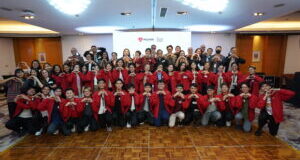A chain of coffee shops near me has had a sign outside their establishments this fall that simply reads, “Pumpkin is a Feeling.” Some might read this and simply conclude that it’s false. Pumpkin isn’t a feeling. It’s a plant!
But when it comes to the pumpkin flavored treats that are popular each autumn, the most important thing isn’t the presence or absence of that specific plant. The important thing is evoking a feeling. Pumpkin puree is of course an important ingredient in many pumpkin flavored treats, most notably the iconic pumpkin pie. Yet when people want to evoke pumpkin pie, it’s often just as important for them to include pumpkin pie spice, a blend that includes nutmeg, cinnamon, allspice, ginger, and cloves. There’s a reason that Starbucks doesn’t name their signature fall drink simply a “pumpkin latte,” but rather a Pumpkin Spice Latte. These spices evoke a set of feelings that people in our culture associate with pumpkin pie, which they likewise associate with Thanksgiving and fall. And as pumpkin spice flavored treats proliferate, this association between this spice blend and fall is reinforced.
As a result, the most salient feature of a “pumpkin” flavored product might not be the presence of pumpkin at all. Instead, it’s whether the flavors in the product evoke the correct culturally constructed feeling!

If your sole lens for understanding the world were botany, biology, or another natural science, this might seem odd. Are people simply making a mistake? Are they using the word “pumpkin” incorrectly?
But if you take social science seriously, the actions and choices of consumers and producers can become intelligible. This is because, as Nobel laureate in economics F.A. Hayek taught us, the facts of the social sciences are what people believe and think.
Hayek emphasizes that social sciences are concerned with people, their choices, and their relationships and interactions. This impacts which features of an object are most relevant for identifying and analyzing it. Hayek asks, “Is it the physical attributes of the objects—what we can find out about these objects by studying them—or is it by something else that we must classify the objects when we attempt to explain what men do about them?”
To answer this question, Hayek considers “such things as tools, food, medicine, weapons, words, sentences, communications, and acts of production—or any one particular instance of any of these.” He argues that these concepts do not refer “to some objective properties possessed by the things, or which the observer can find out about them, but to views which some other person holds about the things.” Rather, they are defined “defined only by indicating relations between three terms: a purpose, somebody who holds that purpose, and an object which that person thinks to be a suitable means for that purpose.” The operative word here is thinks. A person’s thoughts, beliefs, and purposes are what defines something as an instance of one of these social categories.
Each fall, many consumers act with purpose. We want the flavor of pumpkin pie and its associated spices. We want the feelings, moods, vibes, and associations it evokes. And to achieve these ends, we purchase products that we believe and think will have that flavor. The physical properties of these products will vary. Some contain pumpkin puree, while others do not. The pumpkin spice flavored Oreos that I’m eating right now do not include “pumpkin” on the ingredients list. But their appearance and flavor serve my purposes, and likely served the purposes of various other pumpkin spice enthusiasts this autumn. The physical features of these cookies differ substantially from the various pumpkin-flavored coffee drinks that people are buying this fall. But they serve complementary purposes and plans.
To understand the decisions consumers and producers made that led us here, you need to consider the relevant facts. Not the facts of the natural sciences, but the facts of the social sciences. Not the facts of botany, but the relevant facts about what consumers and producers believe and think.
Nathan Goodman is a senior fellow at the F.A. Hayek Program for Advanced Study in Philosophy, Politics, and Economics at the Mercatus Center at George Mason University. His research interests include defense and peace economics, self-governance, polycentricity, public choice, institutional analysis, and Austrian economics.




